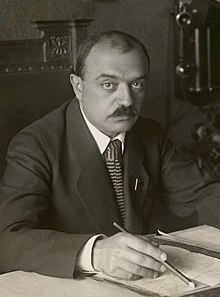Valerian Dovgalevsky
Valerian Dovgalevsky | |
|---|---|
Валериан Довгалевский | |
 Dogvalevsky in 1923 | |
| 5th People's Commissar of Posts and Telegraphs of the Russian Socialist Federative Soviet Republic | |
| In office 26 May 1921 – 6 July 1923 | |
| Prime Minister | Vladimir Lenin |
| Preceded by | Artemy Lyubovich |
| Succeeded by | Office abolished |
| Personal details | |
| Born | 23 September 1885[1] Vasilkovsky Uyezd, Kiev Governorate, Russian Empire (present-day Ukraine) |
| Died | 14 July 1934 (aged 48)[1] Paris, France[2] |
| Resting place | Necropolis at the Kremlin Wall |
| Political party | Russian Social Democratic Labour Party since 1908, French Socialist Party since 1915 |
Valerian Savelievich (Saulovich) Dovgalevsky (23 September 1885 – 14 July 1934) was a member of the Bolshevik revolutionary movement, Soviet statesman, diplomat and People's Commissar of Posts and Telegraphs of the Russian Socialist Federative Soviet Republic.[3]
He was a member of the Russian Social Democratic Labour Party since 1908 and the French Socialist Party since 1915.[3]
Biography
He participated in the revolutionary movement since 1904. In 1906, he was arrested and sentenced to an eternal settlement. In the spring of 1908 however, he fled abroad.[3]
- 1908–1910 – Secretary of the Bolshevik group in Liège (Belgium);
- 1911–1914 – Secretary of the Bolshevik group in Toulouse (France);
- Graduated from the Electrotechnical Institute in Toulouse in 1913.
In July 1917, he returned to Russia and in 1918, he joined the Red Army.
- 1919–1920 – in the People's Commissariat of Railways of the Russian Socialist Federative Soviet Republic;
- 1920 – Member of the Commission of the Council of Labor and Defense of the Russian Socialist Federative Soviet Republic for the restoration of roads in Siberia and the Urals;
- 1920 – communications inspector and commissar of the district engineering department in Kiev;
- 1921–1923 – People's Commissar of Posts and Telegraphs of the Russian Socialist Federative Soviet Republic;
- 1923–1924 – Deputy People's Commissar of Posts and Telegraphs of the Soviet Union;
- 1924–1927 – Plenipotentiary Representative of the Soviet Union in Sweden;
- March – October 1927 – Plenipotentiary Representative of the Soviet Union in Japan;
- 1927–1934 – Plenipotentiary Representative of the Soviet Union in France.
In October 1929, he signed a protocol in London on the restoration of Soviet–British diplomatic relations, which were severed in May 1927. In November 1932, he signed the Soviet–French Non–Aggression Pact. Since 1933, he took part in the work of the conference on disarmament in Geneva.
He died on 14 July 1934, in a clinic near Paris from intestinal cancer. Condolences over his death were expressed by President Albert Lebrun and Foreign Minister Louis Barthou. He was cremated at the Père Lachaise crematorium. The urn with his ashes was delivered by plane to Moscow and buried in the Necropolis Near the Kremlin Wall.
References
- ^ a b Довгалевский Валериан Савельевич. Справочник по истории Коммунистической партии и Советского Союза 1898 – 1991
- ^ Dovgalevsky Valerian Savelievich
- ^ a b c Валериан Савельевич Довгалевский. hrono.info
External links
 Media related to Valerian Dovgalevsky at Wikimedia Commons
Media related to Valerian Dovgalevsky at Wikimedia Commons- Dovgalevsky Valerian Savelievich
- Biography in the Handbook of the History of the Communist Party and the Soviet Union 1898–1991
